Categories: "Food"
Ряженка
The Russians drink a variety of fermented milk products and one of them is ряженка. You take milk, mix it with a bacterial culture, let it ferment for six to eight hours, then bring the process to a close. Essentially it is a type of yogurt without any flavor additives. Compared to кефир kefir, it's flavor is less acidic. We have no special word for this in English, so we usually just transliterate it as ryazhenka. It declines like this:
| Sg | |
| Nom | ряженка |
| Acc | ряженку |
| Gen | ряженки |
| Pre | ряженке |
| Dat | |
| Ins | ряженкой |
This last week I bought a packet of ряженка at the store. That's right: in Russia cold liquids are often sold in plastic packets. Here you can see it on the left. I drink about half a packet at a time, pouring it into a glass, which you can see on the left:
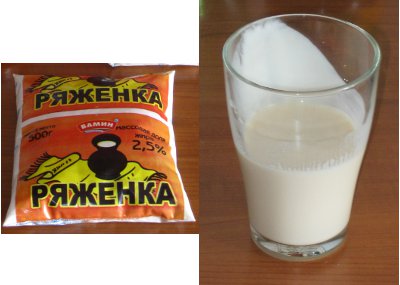
Now a thoughtful homemaker will wonder, “If it is in a floppy plastic bag, how the heck am I supposed to store an opened packet in the fridge?” Why, you stand the packet up in a mug, of course!
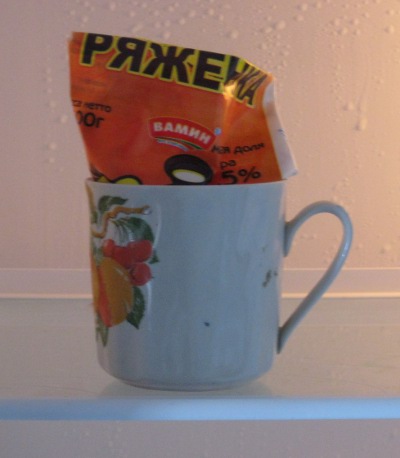
Let's see the word in some sentences:
| — Где тут можно купить ряженку? — За углом, в «Пятёрочке». |
“Where can I buy ryazhenka?” “Around the corner at the Pyatyorochka [store].” |
| Ряженка — кисломолочный напиток, получаемый из коровьего топлёного молока молочнокислым брожением. (source) | Ryazhenka is a fermented milk product made from heated cow's milk by lactic (acid) fermentation. |
| Ненавижу Америку. Там нет ряженки. А что я должна пить на завтрак? ¹ | I hate America. There's no ryazhenka there. So what am I supposed to drink for breakfast? |
| Я обожаю холодный ягодный суп с ряженкой. (recipe) | I adore cold berry soup with ryazhenka. |
Since I'm trying to limit my carb intake this summer, I of course am now wondering what the carb load is. Here's the ingredient lable. The words that appear first are in Tatar, since I am living in Kazan, and the words that follow are in Russian:
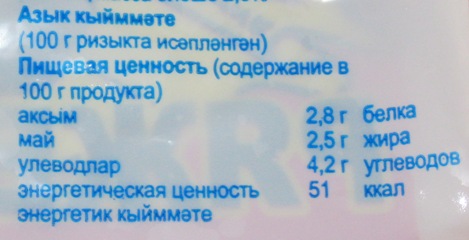
They mean:
| Nutritional value | (per 100 g) |
| Protein | 2.8 g |
| Fat | 2.5 g |
| Carbohydrates | 4.2 g |
| Calories ² | 51 |
Hm. Let's see. 100 mg of ryazhenka has 4.1 g of carbs. I'm limiting myself to 20 g of carbs a day. If a glass is 250 mg, then that's roughly 10 g of carbs for a glass of ryazhenka. Damn. That's half the day's carbs right there. Guess that means that leaves only meat and fat for the rest of the day. Actually, I can live with that.
¹ This was actually said by a Russian woman visiting the US. We had no kefir, no ryazhenka, no tvorog. It was like there was no human food there at all!
² Note to Russian readers: in the US when listing nutritional information, the word "calorie" means "kilocalorie". So for a nutritional discussion, "calorie" is a proper translation for ккал, even though in the metric system that is properly translated kilocalorie.
Перец (часть вторая)
On Monday I depart for Russia. I love spicy food, so usually when I travel I take a bottle of Tabasco Sauce with me. This year, though, I'm taking a jar of ground chipotles with me:
| Чипотле — это копчёный перец «халапеньо» | A chipotle is a smoked jalapeño. |
If that's not an excuse to discuss перец ‘pepper’, I don't know what is. Notice that the word has a fleeting vowel:
| Sg | Pl | |
| Nom | перец | перцы |
| Acc | перец | перцы |
| Gen | перца | перцев |
| Pre | перце | перцах |
| Dat | перцу | перцам |
| Ins | перцем | перцами |
A chipotle is an ugly-looking thing, but the flavor it imparts to food is nigh miraculous. Here on the left you can see one before it's ground. On the right you see the product of grinding six chipotles in the blender.
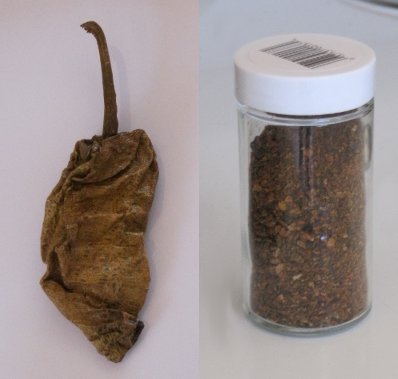
| Я у себя дома размалываю копчёные перцы в блендере. | I grind smoked peppers at home in a blender. |
| Я всегда жарю молотый копчёный перец на масле перед тем, как сделать яичницу. | I always fry some ground smoked pepper in butter before making scrambled eggs. |
| У меня во рту горит от острого перца. | My mouth is burning from the hot pepper. |
| Я люблю есть пельмени со сметаной и молотым копчёным перцем. Это не традиционно, но вкус такой — обалдеть! | I love to eat pelmeni with sour cream and ground smoked pepper. It's not traditional, but the taste is freaking awesome! |
Although I love spicy food, I have to say there is a limit. Jalapeños and serranos are about as hot as I like it. Habaneros? Can't touch them. The hottest pepper in the world, as far as I know, is the naga jolokia. Check out the youtube videos of children and adults making idiots of themselves eating them.
Консервы
The word консервы means “canned food”. It is a word that only occurs in the plural in Russian, never the singular. Such nouns we call “pluralia tantum”. It declines like this:
| Pl | |
| Nom | консервы |
| Acc | |
| Gen | консервов |
| Pre | консервах |
| Dat | консервам |
| Ins | консервами |
Here are some example sentences:
| Самые вкусные консервы — это домашние консервы. | The tastiest canned food is home-canned. |
| Если живёшь в Антарктиде, не обойдёшься без консервов. | If you live in the Antarctic, you can't get along without canned food. |
| — Я недавно прочитал статью о консервах, которая так испугалa меня, что теперь ем только сырые фркукты, сырые овощи и даже сырое мясо. — Фу, как это противно. |
“I recently read an article about canned food that scared me so much that now I eat only raw fruits, raw vegetables, and even raw meat.” “Yuck, that's really gross.” |
| — Здесь продают свежие овощи? — Нет, только овощные консервы. |
"Do they sell fresh vegetables here?" "No, only canned vegetables." |
| — Ты любишь рыбные консервы? — Не очень. |
“Do you like canned fish?” “Not really.” |
| Блин, холодильник пустой. На кухне много консервов, но нечем их открыть. | Crud, the fridge is empty. There is plenty of canned food in the kitchen, but there's nothing to open it with. |
That last line, by the way, is a hint about tomorrow's word of the day...
Клубника

My favorite fruit is the strawberry- клубника. When I was a very young girl in Russia, we had a neighbor who used to grow them in her yard. So my love of the red berry developed early. I will admit to being picky and preferring things with real strawberries over anything that is strawberry-(shudder)flavored.
Я обожаю клубнику.
I adore strawberries.
Notice in that sentence I am using the accusative singular to mean "strawberries." In most situations, people will assume you are speaking of more than one strawberry. The way in America when one says “strawberry pancakes,” we can be pretty sure it is not pancakes with a single berry on top. The most common words for most other berries work the same way; that is, the singular form means “berries en masse”:
У меня так много клубники, что нет места в холодильнике.
I have so many strawberries, that there is no room left in the refrigerator.
I am also quite convinced that any dessert is improved by adding strawberries to it. For example, Crème Brule with a fresh strawberry on top is heaven.
Крем-брюле лучше с клубникой.
Crème Brule is better with strawberry.
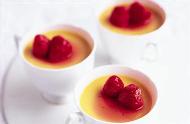
And there is nothing in the world like a fresh strawberry dipped in some high-quality dark chocolate. Yum!
Я не могу жить без клубники.
I can't live without strawberries.
| Sg | |
| Nom | клубника |
| Acc | клубнику |
| Gen | клубники |
| Pre | клубнике |
| Dat | клубнике |
| Ins | клубникой |

Don comments: As mentioned above, most berry words in Russian are singular words that encompass quantities of the berries; i.e., they are singularia tantum like the word ‘money.’ Such words induce singular verb and adjectival agreement, and they generally cannot be used with cardinal numbers. In other words, just as in English you cannot say “one money” or “two moneys,” so in Russian you are not supposed to say «одна клубника» or «две клубники» in the sense of “one strawberry” or “two strawberries.” (Some people still do say it, though.)
Amazingly enough, conversational Russian has a couple of other words that mean “a single berry of the type клубника,” and they are клубничка and клубничина. Thus one can say одна клубничина, две клубничины, одна клубничка, две клубнички.
Свёкла
Many American students visiting Russia for the first time also eat foods that they have never eaten before, and among those foods are свёкла beets. That is not to say that no one eats beets in the US, but you mostly find them eaten by families whose ancestors came from Eastern Europe or by families in farming communities. You will find them in salad bars, of course, but if you watch carefully you will notice that people eat them in very small quantities. Here's how the word declines:
| Sg | Pl | |
| Nom | свёкла | свёклы |
| Acc | свёклу | |
| Gen | свёклы | свёкол |
| Pre | свёкле | свёклах |
| Dat | свёклам | |
| Ins | свёклом | свёклами |
You will note that there is a plural form of the word, but in fact the Russians mostly use the word in the singular where English speakers would use it in the plural.
Why do Russians eat so many beets? Probably because it's a hardy plant that grows well in cold regions. Among the most popular Russian beet dishes are винегрет, a salad made of boiled beets and other vegetables, and борщ, the world-famous beet soup. Sugar is also extracted from the sugar beet.
| Мама приготовила салат из отварной свёклы. Такой салат называется винегретом. | Mom made a salad of boiled beets. That kind of salad is called vinaigrette. |
| В сахарной свёкле содержится тот же сахар, который можно получить из сахарного тростника. (adapted from this source) | Sugar beets contain the same sugar that you can get from sugar cane. |
| Не забудь купить свёклу! | Don't forget to buy beets! |
| Моя бабушка всегда красила губы соком, сделанным из отварной свёклы. | My grandmother always colored her lips with a juice made from boiled beets. |
